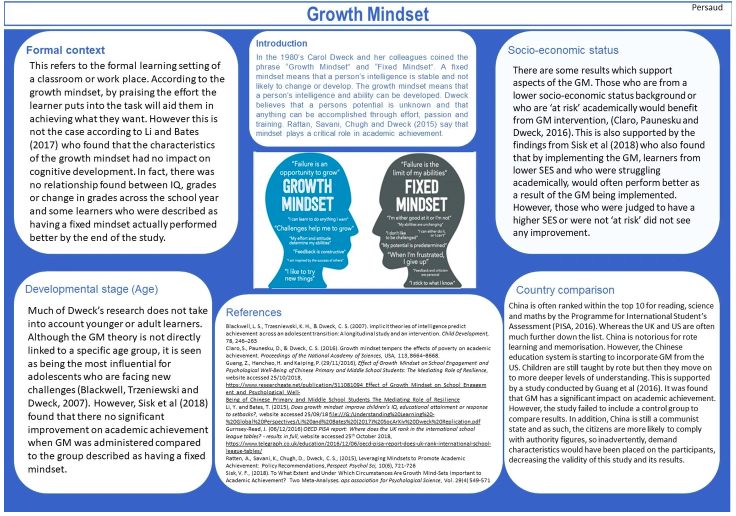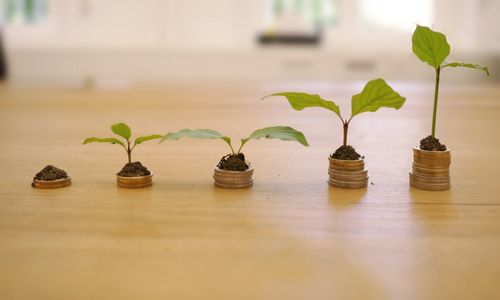For the following article, I have drawn upon published literature and my own experience as a learner and lecturer.

This commentary works in conjunction with the accompanying poster above.
Carol Dweck (2015), the pioneer of the growth mindset concept, believes that everything said to a learner sends a message to them, positive or negative. Dweck says mindset is already being taught to learners informally, whether it be growth or fixed, and this would impact on the learner’s academic achievement. According to Dweck, growth mindset should have an impact regardless of context. Dweck (2016), stated that we should not confuse the growth mindset with having a positive outlook or being openminded or flexible as this was ‘false growth mindset’ and the achievement of a ‘pure’ growth mindset is almost impossible to achieve. Much of Dweck’s research is focused on middle and high schoolers (11-18 years old) with minimal research carried out on primary schoolers and adults (higher education).
I find Dweck a bit confusing and sometimes contradictory. It would be interesting to look further into the use of growth mindset on primary schoolers and younger learners, such as toddlers and babies. I find it difficult to envisage that the ‘fixed mindset’ exists and we do not develop if we have this mindset. For example, if the fixed mindset existed then why can adults, who have no illness or not been involved in a serious accident, are able to walk, talk and are toilet trained. According to Dweck’s theory, we should have all given up at the first hurdle as the fixed mindset is innate and when we learned to do these tasks, we undoubtably failed the first time around. However, a child does not give up at the first hurdle but pursues the task as many times as it takes to achieve and master it. Is this down to having the ‘false growth mindset’ innate in us rather than the fixed mindset? Does the ‘fixed mindset’ exist the way Dweck describes it? When working with learners, is it really growth mindset or is it a shifting their perspective to a positive and openminded outlook whilst informally teaching the skill of flexibility?
I find it quite telling that replications of Dwecks studies, and even some of her own studies to an extent, have not supported the growth mindset theory and have shown that the theory does not positively impact academic achievement across the board when it comes to setting or age. The validity of the study conducted in China is also questionable as per the poster. However, the growth mindset has a trend of positively impacting on lower socio-economic learners and low academic achievers. This could be for several reasons including self-esteem, confidence, society’s view related to stereotypes and the forced characteristics on these learners.
In conclusion, I think aspects of the growth mindset bare consideration, especially when working with low achievers and those from low socio-economic status. But to base schools on this theory and to take on growth mindset as a sole teaching tool, as seems to be the case in the UK and US, is short-sighted and appears to be a failing education system grasping at straws to give the appearance of being fair and politically correct.
References
Blackwell, L. S., Trzesniewski, K. H., & Dweck, C. S. (2007). Implicit theories of intelligence predict achievement across an adolescent transition: A longitudinal study and an intervention. Child Development, 78, 246–263
Claro, S., Paunesku, D., & Dweck, C. S. (2016). Growth mindset tempers the effects of poverty on academic achievement. Proceedings of the National Academy of Sciences, USA, 113, 8664–8668.
Communism Citizens. (Ca. 2014), Rights, website accessed 25/10/18, https://nhdprojectcommunistcitizen.weebly.com/rights.html
Dweck, C. S. (2015), Carol Dweck – Mindset: The New Psychology of Success, Website accessed 25/09/18 https://www.youtube.com/watch?v=aQ0VQjKU8og
Guang, Z., Hanchao, H. and Kaiping, P. (29/11/2016), Effect of Growth Mindset on School Engagement and Psychological Well-Being of Chinese Primary and Middle School Students: The Mediating Role of Resilience, website accessed 25/10/2018, https://www.researchgate.net/publication/311081094_Effect_of_Growth_Mindset_on_School_Engagement_and_Psychological_Well-Being_of_Chinese_Primary_and_Middle_School_Students_The_Mediating_Role_of_Resilience
Gurnsey-Read, J. (06/12/2016) OECD PISA report: Where does the UK rank in the international school league tables? – results in full, website accessed 25th October 2018, https://www.telegraph.co.uk/education/2016/12/06/oecd-pisa-report-does-uk-rank-international-school-league-tables/
Kane, L. (07/09/2017) Chinese children crush Americans in math thanks to a mindset Americans only display in one place: sports, Website accessed 25/10/18, http://uk.businessinsider.com/why-chinese-children-are-better-at-math-than-americans-2017-9?r=US&IR=T
Porzucki, N. (10/12/2013), Can you name the five remaining communist countries in the world?, website accessed 25/10/18 https://www.pri.org/stories/2013-12-10/can-you-name-five-remaining-communist-countries-world
Ratten, A., Savani, K., Chugh, D., Dweck, C. S., (2015), Leveraging Mindsets to Promote Academic Achievement: Policy Recommendations, Perspect Psychol Sci, 10(6), 721-726
Sisk, V. F., (2018). To What Extent and Under Which Circumstances Are Growth Mind-Sets Important to Academic Achievement? Two Meta-Analyses. aps association for Psychological Science, Vol. 29(4) 549 –571
Wikapedia. (23/10/18), Communist State, website accessed 25/10/18, https://en.wikipedia.org/wiki/Communist_state






